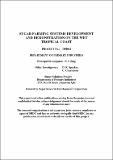| Author | Sing, NC |
| Author | Sparkes, DR |
| Author | Charleston, C |
| Date Accessioned | 2014-01-12 |
| Date Available | 2014-01-12 |
| Issued | 2002 |
| Identifier | http://hdl.handle.net/11079/13241 |
| Abstract | The QDPI Sugar Solutions Project was an extension project focussing on group activities and on-farm demonstrations. Objectives of the project included the development and testing of alternative farming practices to improve the viability of cane production on the Wet Tropical coast from Ingham to Mossman. The alternative farming practices included the use of legume fallows and minimum tillage. |
| Abstract | Extension of these practices was done through a participatory, grower-led action learning approach. Ten grower groups were established throughout the region and a variety of legumes were established on group member farms. Soybean was the main legume promoted for summer fallows as a green manure crop. There was an excellent adoption by farmers from 7 growers, at the start of the project, to over 80 growers and 800 ha by the conclusion of the project. |
| Abstract | A number of other legumes including; peanuts, navy beans, mungbeans and chickpeas were trialed during the winter months. These legumes, which can be grown as cash crops in a short period of time, require greater inputs than soybeans and were not always successful. Growers who did grow winter crops often followed these crops with soybeans in the summer, increasing the fallow period. Growing fallows using minimum or zero tillage was carried out by a number of growers. A few growers also went on to plant cane following the fallows using minimum tillage methods. Adoption of the minimum or zero till concept by growers was not high with only 13% of growers planting fallows using these methods but is regarded as being on the increase. An economic evaluation (spreadsheet), comparing fallow plant with plough-out replant, facilitated change by showing that a well-grown legume fallow and minimum tillage led to a more productive and economic cane cycle. |
| Abstract | Growers who did grow winter crops often followed these crops with soybeans in the summer, increasing the fallow period. Growing fallows using minimum or zero tillage was carried out by a number of growers. A few growers also went on to plant cane following the fallows using minimum tillage methods. Adoption of the minimum or zero till concept by growers was not high with only 13% of growers planting fallows using these methods but is regarded as being on the increase. |
| Abstract | An economic evaluation (spreadsheet), comparing fallow plant with plough-out replant, facilitated change by showing that a well-grown legume fallow and minimum tillage led to a more productive and economic cane cycle. |
| Abstract | Publications during the life of the project included; newsletters, crop guides with
gross margins and a brochure called "Best Practice for Alternative Cane Farming
Systems". These publications as well as numerous media articles aided in the
extension process of these alternative practices. |
| Abstract | The increased adoption of the new technologies is leading to a more sustainable
farming system with more effective fertiliser and chemical usage as well as a
reduction in sediment loss. |
| Language | en |
| Publisher | SRDC |
| Part of Series | Internal Report; 2002 DPI014 |
| Subject | Wet Tropics |
| Subject | Farm management |
| Subject | Action learning |
| Subject | Rotation crops |
| Subject | New farming system |
| Subject | Soybean |
| Subject | Economic analysis |
| Subject | Increase adoption |
| Subject | Sugar Yield Decline Joint Venture (SYDJV) |
| Subject | Farming systems |
| Subject | Production management |
| Title | Sugar farming systems development and demonstration on the wet tropical coast : Final report DPI014 |

